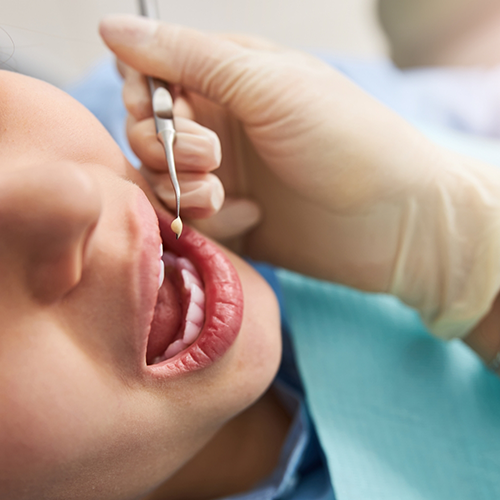Dental Crowns Richardson
Protection for Damaged or Decayed Teeth
If your tooth cannot be restored by a tooth-colored filling, inlay, or onlay, our dentists may recommend a dental crown in Richardson. This restorative dentistry treatment “caps” the healthy part of your tooth, allowing us to retain as much of the natural structure as possible while restoring your smile. If you want to learn more about dental crowns, call our Richardson dental team at 972-848-5333 or read on!
Why Choose Richland Dental for Dental Crowns?
- Compassionate, One-on-One Dental Care
- Comprehensive Dentistry for All Ages
- Affordable In-House Membership Plan
What is a Dental Crown?

One of the more common restorative dental treatments, dental crowns are used to cover compromised teeth while also retaining as much of the natural structure as possible. Although they can be crafted from several dental materials, including gold, most patients prefer porcelain crowns because they look like normal teeth. They also have multiple restorative and cosmetic purposes, including:
- Dental implant restorations
- Dental bridges
- Misshapen teeth
- Broken teeth
- “Caps” for teeth after root canal therapy
The Dental Crown Process

This easy restorative treatment can often be completed in two appointments. At your first visit, we will conduct a comprehensive oral exam to determine if a dental crown is the best way to restore the look, health, and function of your tooth. Then, we will discuss the process with you so you feel confident moving forward with the treatment plan we made.
Next, we will remove any decayed or damaged structure before altering the tooth so the crown fits perfectly. It typically takes about two weeks for the lab technicians to craft your custom restoration, so we will give you a temporary one in the meantime. Then, we will schedule your final visit, which is when we will remove your temporary crown and cement your permanent one in place.
The Benefits of Getting a Dental Crown

Dental crowns continue to be so popular because:
- They are versatile: Dental crowns can complete a single dental implant or cover a badly damaged tooth.
- They are long-lasting: With the proper care, dental crowns can last for 10+ years.
- They are lifelike: The size, shape, and shade of every dental crown is customized, ensuring it looks and feels natural.
- They are cost-effective: Not only are dental crowns less expensive than root canals and tooth extractions, but they often are partially covered by insurance providers.
Have a question for us about dental crowns, including if they are the best restorative treatment for you? If so, contact our dental office or visit us today! Our friendly dentists and team stand ready to help restore your beautiful smile.
Dental Crowns FAQs
What are Dental Crowns Made From?
It’s essential to be well-informed about any procedure that impacts your smile’s appearance and functionality, and dental crowns are no exception. Many patients have questions about how they’re built, including the materials they’re made from.
There are many potential possibilities, but our dental team in Richardson offers the following options:
- Historically, dentists made restorations using amalgam metal that often contained mixtures of silver, nickel, chromium, or palladium infused with mercury. This option is still sometimes used today because it’s incredibly durable, but it’s not ideal for patients sensitive to the materials.
- This biocompatible metal is less likely to trigger an allergic reaction and is sometimes chosen because of its incredible durability and longevity. It doesn’t erode, but it’s also quite noticeable, so it’s often recommended for capping less visible teeth in the back of your mouth.
- This is the most popular option today because these ceramic restorations can be customized to be just the right shape, shade, and size for seamless results. They may not last quite as long as metal versions, but the difference is often negligible.
Are Dental Crowns Permanent?
Dental crowns might wear down and require replacement at some point, so in that regard, they are not considered permanent. However, placing them involves an irreversible preparation of the structure of the underlying tooth; some enamel must be removed and doesn’t regenerate for the cap to fit correctly.
With that said, your tooth-shaped cap isn’t intended to be removed and reinserted like dentures, so it’s often considered a long-term solution rather than a permanent one.
Does Getting a Dental Crown Hurt?
If you’re worried that getting your dental crown could hurt, you’re not alone. Many patients experience anxiety around major procedures like this one. Thankfully, our Richmond Dental team knows that you might be nervous and will do everything we can to help you feel calm and comfortable.
For instance, we’ll apply a local anesthetic before starting your procedure to keep nerves in your teeth, gums, or jaw from sending pain signals to your brain. That way, you won’t have to worry about any adverse sensations until after your appointment. Then, you might feel slightly sore or sensitive after your enamel is thinned or when adjusting to the dimensions of your new tooth, but these symptoms are typically temporary and fade after a few days.
Do Dental Crowns Get Cavities?
Your restoration isn’t made from the same organic compounds as your enamel, so bacteria don’t affect it the same way. It cannot develop cavities, but the underlying tooth is still at risk of oral issues.
To prevent potential problems, you should brush and floss twice daily to remove germs, plaque, and other residue that contribute to tooth decay and gum disease. You should also see our team every six months for a routine checkup and cleaning so we can monitor your condition to catch and address any concerns before they progress.
I Need a Checkup & Cleaning I Need a Dentist for My Child I Have a Cavity or Broken Tooth I am Missing One or More Teeth I Want to Enhance My Smile I Want a Straighter Smile I Have a Dental Emergency I am Worried About Gum Disease I Have Sleep Apnea or Snore I Have Jaw Pain & Headaches I am Scared of the Dentist View Our Services

